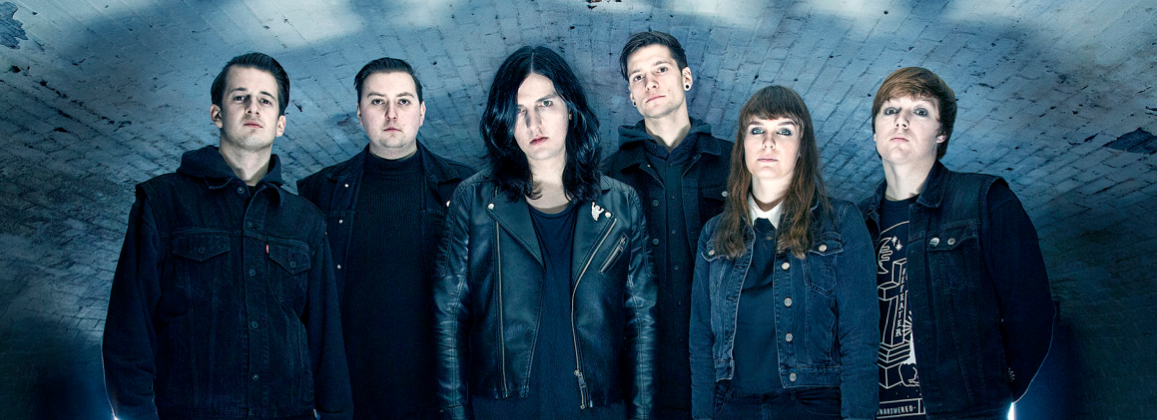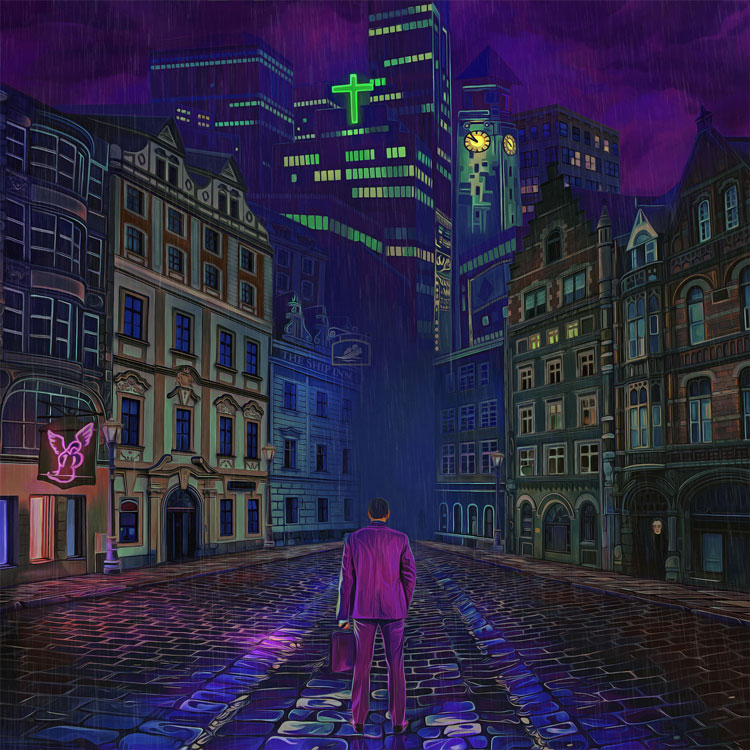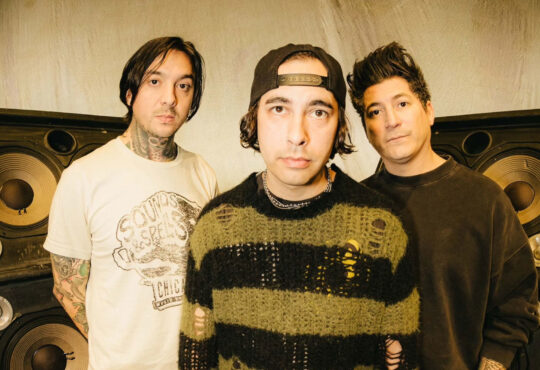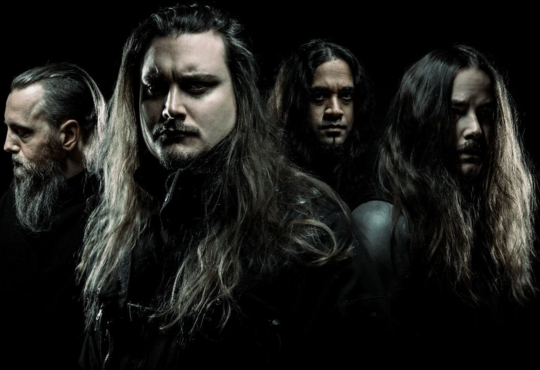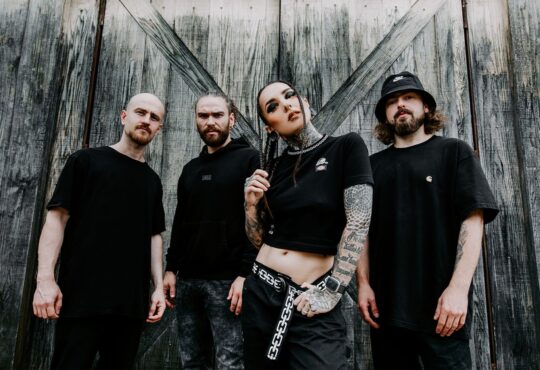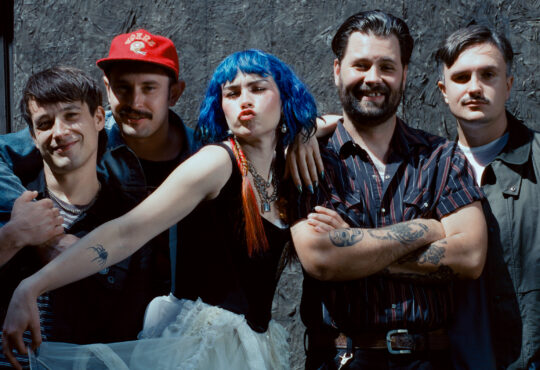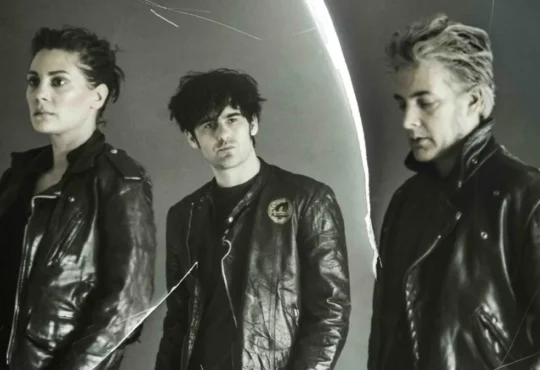A few hours before their show at the Trabendo opening for Pierce The Veil, RockUrLife sat down with Will Gould and Hannah Greenwood, respectively singer and keyboardist of Creeper; the pair going back on the first album to come, the artistic and ethical approches, and the influences of the Southampton sextet whom appears to be one of the biggest revelations of the past couple of years within the British punk rock scene, and furthermore, nothing but the next big thing.
“Eternity, In Your Arms” is set to be released in a few months. Which direction are you going to take with this album? What do you interpret this next work to be about?
Hannah Greenwood (keyboards): There’s a lot of different aspects in the album: very theatrical elements, then very punk ones. All of that is intertwined with a couple of slower songs, yet it all comes together and sets really nicely. We’ve drawn aspects from our three EP (ed. “Creeper” (2014), “The Callous Heart” (2015), “The Stranger” (2016)) and picked things that worked really well.
Will Gould (vocals): Doing three EP allowed us to find what worked for us, focusing on those ideas. Also, we wrote a lot of different songs. We try to be as ambitious as we can when it comes to our music. It led us to be very proud of the music we’ve written. I think it’s the biggest and best thing we’ve done, the best songs we’ve ever written. As far as what I interpret the songs to be about, the Peter Pan story was something that we’ve been using for our music for quite a while now. “The Callous Heart” patch was meant to be a gender neutral lost boys. “The Stranger”, the big tall guy with the mask, he’s supposed to be Tick Tock the crocodile. At this point in our lives, we kind of exist somewhere in between. The everlasting youth that we’ve lost, we’re not youngsters anymore. Everything you’ve come to fear comes down with Tick Tock the crocodile. This album is like Captain Hook in the middle. James Scythe is the character in this record. He’s kind of Captain Hook. It’s about longing for that carelessness, recklessness of youth and living with the anxiety and fear of what’s to come.
Your band is quite mysterious. You seem to do everything in secret. We never know when you’re gonna be back, when you’ll be releasing new music, new music videos. As you mentioned it, you did such a huge promotion for this album, leading you to disappear from social media even as individuals, and giving clues to people so they could investigate. Considering the fact that we’re living in the era of social media and overexposure, do you think mystery and illusion contribute to your band’s success?
Will: I don’t think we’ve necessarily thought about it in this way at first. We didn’t do anything for success. I always think about this thing that I heard from a producer that we really like named Jim Steinman, who told one of his stories once. Someone asked “Who do you make records for?”. Jim replied “The records that I make, I always make them for that kid in Connecticut”. He said “What do you mean? Who’s that kid in Connecticut?”. “This kid in Connecticut doesn’t exist. He’s in my head. Every time I put a record out, he goes to the shop, picks the CD up, puts it in his discman, then he sits in his house when they’re parents are out and listens to the whole record in its entirety. Every time I make a record, I think about that kid in Connecticut doing that.”. That’s how I like to approach everything we do. I like to think that one person likes the tiny things we do. And so, we always put the most effort, the most details, for that one kid. All idea of the mystery was that I wanted to please that kid.
I wanted him or her to have the full emotions on the next part of the story. We always try to think about how to serve songs and our audience the best we can. That was more about doing something for our audience rather than trying to get massive, I suppose. But I think you’re right. Nowadays, social media is into a lot of bands. The mystic and the mystery of bands is really hard to maintain these days, because you can go on to Twitter and see what someone has had for lunch. I’ve tried to temperate how we’ve put ourselves online, because it’s really important. I want people to be able to enjoy the records not thinking about me, Hannah or Ian or whoever. Us as individuals is not as important as the record itself, the music that we make. We have to do what serves the music. There’s a level of respect from us to that project. That’s kind of what it was all about, trying to put on a show, even online. It’s a spectacle we’re trying to put on more largely. It’s really tricky to do in our generation.
There is something very inclusive within your band, whether it comes to you as individuals or your audience/fanbase. Do you think the celebration of different identities plays a role in your music?
Will: It was something that was most certainly in the table when we first started out. When I was a kid, I used to go to shows. There would be punk bands, hardcore bands, a lot of different bands playing. The kids that would come to the shows were there for the music. I feel like as I get older, they became real cliques, like subcultures now. And that’s kind of sad. I miss when people loved music for music. What we like is the idea that when you’d take a look at the crowd, you would see goth kids, punk kids, hardcore punk kids, and so on. There’s a diverse range of people that like our band. Maybe they have nothing in common, but they like the music. That was the whole point of it. So when we came with the back patches, the whole idea was to make something that was visually bounding people together. When you walk down the street and see someone with a “Callous Heart” patch, you know that you’ve got something in common. It’s a unifying thing. Coming from a DIY punk background, we grew up questioning our surroundings and the politics of our world, which means we’d like to break down those barriers. Every time we say “lost boys”, we are mentioning “gender neutral lost boys”, because that would be silly to talk about it another way. We have a lot of friends in the gay community as well, that’s a really big thing for our band. That’s something we really wanted to celebrate and that is part of ourselves too. We’re all about diversity and finding a place we can all fit in together.
I think that’s the magic with punk. You’re in a room, the audience is all one and the band and the audience are no different to each other. That’s when the energy happens. When whatever you’ve been going on in your day drifts away because you’re lost in that energy, that moment. That’s something that’s almost tangible, which is really exciting. We’re trying to bond everyone together and find creative solutions for our mental problems at the same time. Having a safe place to enjoy music is really important for us. Really important for me growing up as well. I was a really anxious kid when I was younger. I wouldn’t leave the house. Then I got into music and I could not not leave the house because I needed to see these bands. I made all my friendships, relationships and everything I’ve every had through music. It has given me the confidence, my career, my outlet for my emotions as well. I wanted to give that back to people. I wanted people to see us and then go start their own band. So when we’re old and can’t keep up anymore, we can go see those bands. (laughs)
Let’s talk about ego now. Everybody has one, but in terms of sharing creativity, making music together, there must be a time when those egos clash. Somebody might have an idea, which is not really accepted by others etc. From your experience, how much ego is present in the process of shared creation?
Hannah: Everybody’s got their own ego. With us especially, because there’s a lot of us, in terms of the writing process, it’s always Will and Ian basically. I think because they’ve known each other for years, they work really really well. But we’ve all got different personalities. When you bring them all together, it can work and make something that nobody had every taught of. So I think we do work quite well, we don’t tend to clash too much to be honest.
Will: It feels like we’re a little family. For example, Hannah has a song on this record which we did together in the studio and worked on singing. This is a song where I didn’t do too much at all. We’re trying to reach that way. One of my favorite bands is Arcade Fire. I love the way they bring different instruments and players on it. We always try to serve the songs the best we can. Me and Ian tend to write the majority of the songs, but people have different things they prefer too. Sean is Mister Organization. He has to get everything done. He loves doing that, and he’s really good at it. Different people have different things they do. It’s like a little self contained universe, everyone adding a little something here and there. I feel like the diversity on this record comes from the six of us and having more instruments also. We’ve got a trumpet player on this record. He’s not even in our band, but we said we wanted a trumpet player on that one to make it sound like a 50’s rock n’roll song, like Chuck Berry’s. Hannah can play all sorts of instruments, like violin, piano, singing. Hannah probably plays the most in the record in terms of instruments and layers. We’re often like “Oh, we need this or that instrument. Hannah can do it!” (laughs) One of the most amazing things is having a big range of colors that makes everything a little more rich and intense. I think we haven’t worried too much about ego.
Hannah: None of us is really egotistical.
Will: For example, we all do interviews differently. People often tend to want to speak to me because I’m the singer, but I wouldn’t really care if they didn’t. Hannah and Ian sort out interviews a lot of times. Even though I suppose me and Ian write the majority of the songs, because there’s so much more going on in our band than just writing songs, everyone does something.
In addition to your music, you’ve developed a very specific and easily recognizable visual identity. What is the relationship between your music and other artistic endeavors?
Will: Mainly, a lot of the aesthetic comes from films. Me and Ian were film students. When we’re thinking about the current theme for the band, it’s usually Winona Ryder films like Heathers, mostly 80’s teen films. That’s kind of the vibe for this. We have pastiches of different things in our videos. In our video for “The Honeymoon Suite”, there’s a Southampton street sign and the back of it says “Beware the Callous Heart”; it’s a reference to Lost Boys’ Santa Carla city being labelled “murder capital of the world”. There’s a lot of nods to films that have influenced us. In our new videos that we haven’t released yet, there’s a lot of playground on films noirs. There’s some voyeuristic aspect to some of the videos. When we very first started, we wanted everything to look like it was a Curtis Hanson film, but never really worked out. So all the visual clues come from film really. “Cry Baby” is one of Sean’s favorites for example. Every time we make a record or a song, I’d put layers of screenshots from films that are going to be important to be the headspace for. “Twin Peaks” was a very big reference for us. “X Files”, things like that. It gives us a base to work from. There’s obviously a lof of music involved too. Hannah you like classical music, don’t you?
Hannah: Yes. I grew up as a classical musician. Actually, I tried to get in as a classical musician but I didn’t, otherwise I wouldn’t be sitting here. (laughs). It’s nice because I didn’t grow up in a DIY punk scene. I came from a completely different background. But I think that being able to play classical instruments such as the violin or piano brought us to this theatrical aspect of writing. It just brings a whole different style, but it actually fuses very nicely. Punk and classical music actually make a really great couple.
Will: It’s mainly music in films that all stimulates us. Creeper is a reflection of pop culture in terms of what we do aesthetically. When we’re thinking about songs, a lot of times we’re thinking of how it would look on screen as well, thinking visually about music. There’s this great artist called Graham Humphreys, who did all the poster art for famous 80’s movies such as “A Nightmare On Elm Street” with photo-realistic paintings, and he’s working with us at the moment. We’re super excited about that. To fuse those two worlds together is great. It means we can deep our hands in lots of different pies. (lughs)
We’re done. Thank you for your answers. See you later!
Will and Hannah: Thanks a lot!
Website: creepercult.com



